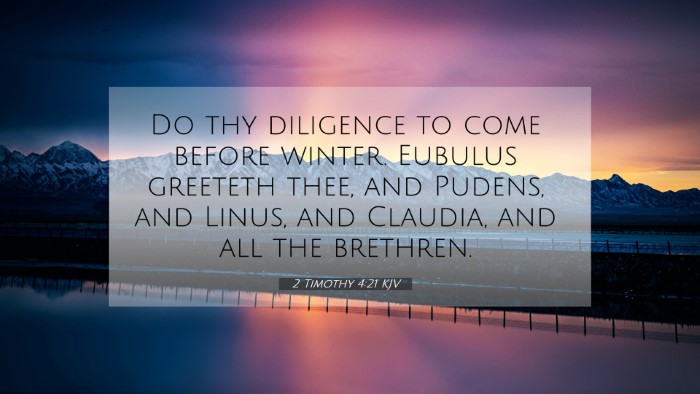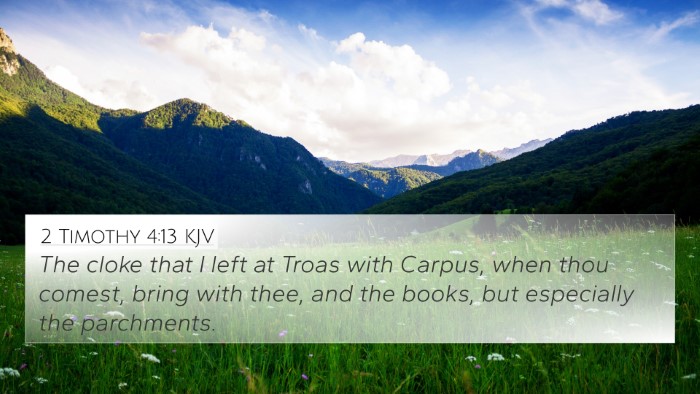Understanding 2 Timothy 4:21
Verse: 2 Timothy 4:21 - "Do your utmost to come before winter. Eubulus greets you, as well as Pudens, Linus, Claudia, and all the brethren."
Verse Explanation
This closing exhortation from Paul emphasizes his urgent plea for Timothy to visit him before the harsh conditions of winter set in. In a broader context, it reflects Paul's awareness of his impending death, as he writes from a Roman prison.
Key Themes
- Urgency and Timeliness: Paul’s request highlights the importance of acting promptly in our spiritual journeys.
- Community and Relationships: The mention of Eubulus, Pudens, Linus, and Claudia underscores the significance of Christian fellowship.
- Faithfulness among Believers: Paul’s greeting points to the unity and support among the early Christians, which can serve as a model for today's church.
Combining Insights from Commentaries
Matthew Henry: Henry emphasizes the despair in Paul's letter, reflecting his longing for companionship in lonely times. He notes that Paul’s urgency indicates a specific knowledge of his circumstances and the need for Timothy’s support and encouragement.
Albert Barnes: Barnes suggests that Paul’s mention of various individuals serves not only to convey greetings but also to remind Timothy of the community that surrounds them in service to Christ. This can encourage Timothy to remain steadfast in his ministry amidst challenges.
Adam Clarke: Clarke expands on the significance of the names mentioned, interpreting them as representative of the broader Christian family. He notes that these individuals may have played pivotal roles in the ministry, showcasing the importance of perseverance in faith even when facing adversities.
Bible Cross-References
To gain a deeper understanding of 2 Timothy 4:21, we can explore various cross-references that resonate with its themes:
- 2 Timothy 4:10: Paul mentions Demas who deserted him, highlighting the reality of abandonment in ministry versus the importance of faithful companions.
- Philippians 2:25: Paul refers to Epaphroditus as a fellow worker, indicating the collaborative spirit of the early church.
- Hebrews 10:24-25: Encouragement to consider how to stimulate one another to love and good deeds speaks to the value of gathering together.
- Acts 20:35: Paul emphasizes helping the weak, aligning with the sentiments of companionship and community expressed in his letters.
- 1 Thessalonians 5:11: Encouragement to build one another up supports the idea of community solidarity found in Paul's letter.
- 2 Timothy 1:16-18: The mention of Onesiphorus being unashamed of Paul's chains illustrates loyalty amidst suffering.
- Romans 1:11: Paul expresses his desire to impart spiritual gifts, showing the importance of mutual encouragement in faith.
- Colossians 4:7-14: A list of Paul's coworkers illustrates the extensive network of support within the early church.
- 2 Corinthians 1:24: Paul speaks about working together for joy, reinforcing the idea of fellowship and support in ministry.
- 1 Peter 4:10: The call to use one's gifts to serve others is reminiscent of Paul’s concern for the collective well-being of the church.
Connections to Other Scriptures
The appeal made in 2 Timothy 4:21 illustrates the interconnectedness of biblical texts and their shared themes of community, support, and the urgency of spiritual readiness:
- Inter-Biblical Dialogue: The letter serves as a bridge connecting the pastoral concerns of Timothy with broader Pauline themes on discipleship.
- Comparative Bible Verse Analysis: By examining 2 Timothy alongside the pastoral epistles, it becomes clear that the need for encouragement and faithfulness is quintessential in the Christian walk.
- Thematic Bible Verse Connections: The verses emphasize that the call for companionship resonates through various scriptures, reinforcing community in faith.
In conclusion, 2 Timothy 4:21 is rich with meaning reflecting the urgency of ministry, the importance of companionship, and serving in the community as believers. Its connections to other scriptures provide a comprehensive view of early Christian life and the ongoing relevance for modern believers.











